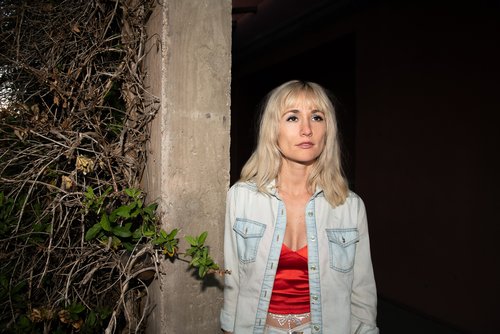
As much as she’s a songwriter, Esther Rose is a scene setter, a crystallizer of moments, and a full time inhabitant of the dimly-lit world depicted in her songs. Rose found her voice over the course of years spent regularly performing and recording in New Orleans, combining her DIY work ethic with an affinity for traditional country arrangements. Though still dressed with the dreamy lap steel, fiddle, and string bass accompaniment of earlier material, sophomore album You Made It This Far took on a far more personal tone. The songs were at times cuttingly direct, with storytelling lyrics culled straight from lived experiences both stormy and revelatory.
This unadulterated self searching reached new levels of emotional resonance on third album How Many Times. Tracked live to tape with help from co-producer Ross Farbe from synth pop band Video Age, Rose and her small band cultivate a warm, lived-in atmosphere to deliver songs that are deceptively restless and turbulent. Swaying vocal harmonies and dialed back, straightforward instrumental backing congeal around Rose’s most fully realized work to date. As the album spins on, Rose navigates the chaos, upheaval, and exposed nerves of self discovery, and tells the tale with an intimacy that makes even the most painful moments feel almost sweet.

Dean Johnson
With I Hope We Can Still Be Friends, his debut for Saddle Creek, Dean Johnson makes a pact
with the listener: He will sing you his truth in the most heartfelt and charming way possible, if
you promise to keep an open mind.
The title partly stems from the playful way the Seattle-based singer, songwriter and guitarist
communes with his audiences at concerts. “I hope you’re not afraid to talk to me after the show,”
he’ll say, sweetly, before launching into “Death of the Party,” the album’s seventh song.
Centered on the “energy vampire” archetype — the exasperating windbag we’ve all
encountered at some point — its lyrics are at once intellectually biting and unmistakably
hilarious. His tender voice rings out like the ghost of Roy Orbison or a misfit Everly brother.
“Words don’t come easily to me / I notice you don’t have that problem / It sounds to me you
cannot stop them,” Johnson sings over acoustic guitar strumming, and gentle bass and drums,
like the narrator in a dark comedy whose coming-of-age misadventures have made for an
excellent film.
Johnson spent years tending bar at Al’s Tavern in Seattle’s Wallingford neighborhood. There,
he encountered folks of all stripes; and regulars enthusiastically murmured about his budding
musical greatness — There’s the best songwriter in town! Johnson was a kind of local lore, a
long-held family secret, before the singer finally broke out in 2023 with his debut album, Nothing
For Me Please, at age 50.
“‘Death of the Party’ is a great example of that,” he says of the sociological experience of
bartending. “Being in that environment, lyrics did solidify. If I was working on a song, it wasn’t
unusual for some new aspect of it, or a line that was too vague, to suddenly come into focus.”
I Hope We Can Still Be Friends is essentially an anthology that bridges Johnson’s earliest days
as a songwriter with his present-day outlook and abilities. There are songs that have been in his
setlists for years, and others that will be new to fans. Each of its 11 tracks contains jocular social
commentary or lovingly rendered affairs of the heart. The album’s songs about love and
relationships offer another way to interpret its title: as a parting thought to an ex.
Like all of Johnson’s cable-knit writing, the title is a clever banner for the album’s dual nature,
the thing that binds its tragedy and comedy masks. Johnson explains that he didn’t set out to
make a concept album. It’s a coincidence that about half of the album’s songs are a bit
sardonic, and the other half are more lighthearted. The singer playfully refers to the former as
his “mean” songs, which is why the album’s back cover is adorned with a warning that says
“Beware of Dean.”
Like John Prine or Kris Kristofferson’s country-adjacent sound, devastating humor and
economical profundity refracted through a barroom’s haze, the album is filled with easygoing
twang, sad characters, universal truths and the absurdity of everyday life. “Carol” recounts the
numb consumption and dissipating cultural attention that is besieging America. There’s a search
for optimism amid meditations on dying in a plane crash in “Before You Hit the Ground.”
Romance that is best forgotten steers “So Much Better” — only Johnson could weave
electroconvulsive therapy into a gentle, chuckle-inducing missive on unbearable heartbreak.
I Hope We Can Still Be Friends floats in a liminal plane between timely and timeless, its
minimalist instrumentation elevating Johnson’s affecting voice to new heights. Recorded at
Unknown Studio in Anacortes, Washington, the record was produced by Sera Cahoone — the
Seattle-based singer-songwriter Johnson describes as a “soulmate sibling.” Overdubbing took
place at Seattle’s Crackle & Pop!
For the sessions, Johnson assembled a small band of friends including Abbey Blackwell (bass,
backing vocals), multi-instrumentalist Sam Peterson and Cahoone (drums, backing vocals), who
created a familial tone on the already intimate album. I Hope We Can Still Be Friends, with its
sharp observations and stirring personal insights, holds space for both intense reflection and
emotional release. You may laugh, or cry or both. In this sense, the album is powerful medicine
— a way to both expose yourself to and inoculate yourself against the ugly, absurd, existential
and heartbreaking. At its core rests a basic truth that is often difficult to remember or accept:
Happiness wouldn’t exist without sadness as its counterpart.
On his uncanny ability to so clearly see and then encapsulate humanity in all its messy glory,
Johnson offers this core memory, drawn from his childhood on Camano Island in the Puget
Sound. “I was raised on a bluff,” he says. “I’m not trying to make it sound dramatic, but I did
have a sweeping view.”



